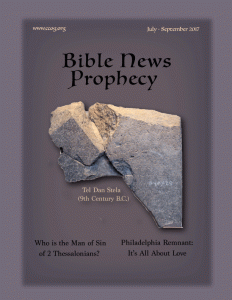Anyway, I also spoke with Norman Edwards about it, and here is information from some of the beginning of his article:
Old Testament Preponderance of Prophets
Remove prophets from the Old Testament and there is not much left. In the Pentateuch—the first five books—Enoch, Abraham, Moses and Aaron were all regarded as prophets (Jude 1:14; Genesis 20:7; Deuteronomy 34:10; Exodus 7:1). After the Pentateuch, almost everything else is the words of a prophet. Jesus recognized the Old Testament Scripture divisions of the Law and the Prophets (Matthew 5:17; 7:12; 11:13; 22:40; Luke 16:16; John 1:45) and “Law, Prophets and Psalms” (Luke 24:44).
Indeed, the Jewish Scribes classify Psalms, Job, Proverbs, Chronicles and several small books as “The Writings”. These are possibly the least prophetic books, but there are many Psalms that are prophetic of Christ—David being a prophet (Acts 2:29-30). Chronicles contains some of the same prophets as Kings and the five “Festival Books” are also treated as prophetic allegory.
The Jewish Scribes have long regarded the books of Joshua, Judges, Samuel and Kings as the “Former Prophets”, including the stories of the prophets Samuel, Nathan, Gad, Elijah, Elisha, etc. The “Latter Prophets” are Isaiah, Jeremiah, Ezekiel, Daniel and the twelve “Minor Prophets”. Whether it be the writing of Scripture, or a spoken but unwritten prophecy (1 Kings 22:8), these prophets were the communication between God and mankind.
The scripture gives us a definition of a prophet—showing that there are different kinds of them:
Then He said, “Hear now My words: If there is a prophet among you, I, the LORD, make Myself known to him in a vision; I speak to him in a dream. Not so with My servant Moses; He is faithful in all My house. I speak with him face to face, Even plainly, and not in dark sayings; And he sees the form of the LORD. Why then were you not afraid To speak against My servant Moses?” (Numbers 12:6-8).
Some prophets hear from God in visions or dreams. A very few—like Moses—speak to him face to face. Other scriptures show that some prophets hear from angels (Judges 6:11-12; Numbers 22:35; 1 Kings 13:18; Zechariah 1:1 – 6:9). But the common thread of all of this is that it is a message directly from God. Occasionally, people will think this verse means that an exhortation or exposition of the Scripture is prophesying: “But he who prophesies speaks edification and exhortation and comfort to men” (1 Corinthians 14:3). This scripture gives the effect of prophecy, not the definition of it. Every place in the scripture where we have the words of a prophecy, it is something that God gave that would otherwise not be known. Every place where the Scripture gives the words of a prophecy, we can see that it was the words of God—something people would not know on their own. It is not simply a sermon, teaching, or repeat of other Scripture. The Apostle Peter concurs:
Knowing this first, that no prophecy of Scripture is of any private interpretation, for prophecy never came by the will of man, but holy men of God spoke as they were moved by the Holy Spirit (1 Peter 1:20-21).
If a person prophesies once, does that make him a prophet? Probably not! A person can prophesy a time or two, but not be able to do it whenever he wants, whereas the major prophets of the Bible often went to God with a variety of questions and received answers. The Scripture contains no clear definition of how many times a person must prophesy to become a “prophet”. King Saul is an interesting example. Twice, the Spirit of God came upon him and he prophesied, but near the end of his life he sought the word of the Lord and did not receive it (1 Samuel 10:10-12; 19:20-24; 28:6). The people of his day made a saying: “Is Saul among the prophets?” They did not know for sure if Saul was a prophet, and we may not always know who is a prophet today. But we know we can trust the prophecies of Scripture, and the New Testament tells us how to deal with the prophets of our day.
Prophets Continue in New Testament
The words “prophet”, “prophecy”, “prophesy”, and their various forms occur in 202 verses in the New Testament
• 40 refer to specific Old Testament prophets or their prophecies (Matthew 1:22; 2:5, 15, 17, 23; 3:3; 4:14; 8:17; 12:17, 39; 13:14, 35; 15:7; 16:4; 21:4; 24:15; 27:9, 35; Mark 1:2; 7:6; 13:14; Luke 3:4; 4:17, 27; 11:29; John 1:21, 23, 25; 12:38; Acts 2:16, 30; 3:24; 7:42, 48; 8:28, 30, 34; 13:20; 28:25; Jude 1:14).
• 36 refer to prophets in general—could be Old, New or between Testaments (Matthew 13:57; 23:29, 30, 31, 34, 37; Mark 6:4, 15; Luke 1:70; 4:24; 6:23; 11:47, 49, 50; 13:28, 33, 34; John 4:19; 7:52; Acts 3:18, 21, 25; 7:52; 10:43; Ephesians 2:20; 3:5; James 5:10; 1 Thessalonians 2:15; 2 Peter 1:19; 3:2; Revelation 10:7; 11:18; 16:6; 18:20, 24; 22:6).
• 24 are references to the portion of the Old Testament Scripture known as “the Prophets” (Matthew 5:17; 7:12; 22:40; 26:56; Luke 16:16, 29, 31; 18:31; 24:25, 27, 44; John 1:45; 6:45; Acts 13:15, 27, 40; 15:15; 24:14; 26:22, 27; 28:23; Romans 1:2; 3:21; 16:26).
• 23 verses show that prophesying is a gift of the Holy Spirit which Christians should seek and use in Christian congregations as instructed (Acts 2:17, 18; 19:6; Romans 12:6; 1 Corinthians 11:4, 5; 12:10, 28; 14:1, 3, 4, 5, 6, 22, 24, 31, 39; Ephesians 4:11; 1 Thessalonians 5:20; 1 Timothy 1:18; 4:14; Revelation 19:10; 22:9).
• 19 refer to false prophets which often tried to deceive believers (Matthew 7:15, 22; 24:11, 24; Mark 13:22; Luke 6:26; 7:26, 28; 20:6; Acts 13:6; Titus 1:12; 2 Peter 2:1, 16; 1 John 4:1; Revelation 2:20; 10:11; 16:13; Revelation 19:20; 20:10). • 18 verses refer to 19 specific New Testament prophets or their prophecies: Zecharias (father of John the Baptist), John the Baptist, Anna, Caiaphas, Agabus, Barnabas, Simeon who was called Niger, Lucius of Cyrene, Manaen who had been brought up with Herod the tetrarch, Saul, Judas, Silas, Philip’s four daughters, the apostle John and the “two witnesses” (Matthew 11:9, 21:26; Mark 11:32; Luke 1:76; 2:36; John 11:51; Acts 13:1; 15:32; 21:9, 10; Revelation 1:3; 11:3, 6, 10; 22:7; 10, 18, 19).
• 16 verses refer to the Old Testament prophets generally (Matthew 5:12; 11:13; 13:17; 16:14; Mark 8:28; Luke 9:8, 19; 10:24; John 8:52, 53; Romans 11:3; Hebrews 1:1; 11:32; 1 Peter 1:10; 2 Peter 1:20, 21).
• 16 verses call Jesus a “prophet” (Matthew 14:5; 21:11, 46; 26:68; Mark 16:65; Luke 7:16, 39; 22:64; 24:19; John 4:19; 6:14; 7:40; 9:17; Acts 3:22, 23; 7:37).
• 7 verses give cautions to prophecy: It is not the most important; It is not necessary for every believer; It may require other believers to judge its validity and agreement with Scripture; Prophets should have control of themselves when they prophesy (1 Corinthians 12:29; 13:2, 8, 9; 14:29, 32, 37).
• 3 verses refer to unidentified New Testament prophets (Matthew 10:41; Acts 11:27; 19:6).
In summary, the Gospels and Acts make many references to the Old Testament prophecies of Christ and to the Pharisees and Sadducees’ ancestors who persecuted the Old Testament prophets. In Romans through Revelation, most of the verses are about the spiritual gift of prophecy and its use in the church.
We will cite a few examples:
Having then gifts differing according to the grace that is given to us, let us use them: if prophecy, let us prophesy in proportion to our faith (Romans 12:6).
Pursue love, and desire spiritual gifts, but especially that you may prophesy (1 Corinthians 14:1).
Let two or three prophets speak, and let the others judge (1 Corinthians 14:29).
Therefore, brethren, desire earnestly to prophesy, and do not forbid to speak with tongues. Let all things be done decently and in order (1 Corinthians 14:39-40).
Do not despise prophecies. Test all things; hold fast what is good (1 Thessalonians 5:20).
“And I will give power to my two witnesses, and they will prophesy one thousand two hundred and sixty days, clothed in sackcloth. … These have power to shut heaven, so that no rain falls in the days of their prophecy; and they have power over waters to turn them to blood, and to strike the earth with all plagues, as often as they desire (Revelation 11:3, 6).
The exact same words are used for both Old and New Testament prophets and prophecies. There is not a big powerful word for Moses, Isaiah and Jeremiah, and a “little prophet” word used for Agabus and Philip’s four prophesying daughters. They all prophesy—speak for God at times. For those who have studied New Testament prophets, it seems so natural. But for many believers, especially those in big church organizations, it is a point of difficulty. Why?
Prophets Do Not Come
Easily Obviously, one cannot prophesy by one’s own will. God has to do it. But most Christians do not pray for the gift and would be skeptical of others who claim to have it. Why? Because the message God gives to prophets is sometimes hard to take. It may not be in agreement with what we want or think. It will often not be in agreement with today’s religious or political leaders. Church organizations usually function by making goals, budgets, doctrinal statements, evangelistic plans, growth targets, etc. Leaders can control these things, but they cannot control God or His prophets and prophecies. Prophets speak God’s words and may or may not agree with the teachings and practices of a church group. Notice these New Testament prophecies that were not easy for the leaders and the people to accept:
Now there was a certain disciple at Damascus named Ananias; and to him the Lord said in a vision, “Ananias.” And he said, “Here I am, Lord.” So the Lord said to him, “Arise and go to the street called Straight, and inquire at the house of Judas for one called Saul of Tarsus, for behold, he is praying. “And in a vision he has seen a man named Ananias coming in and putting his hand on him, so that he might receive his sight.” Then Ananias answered, “Lord, I have heard from many about this man, how much harm he has done to Your saints in Jerusalem. “And here he has authority from the chief priests to bind all who call on Your name.” But the Lord said to him, “Go, for he is a chosen vessel of Mine to bear My name before Gentiles, kings, and the children of Israel (Acts 9:10-15).
And in these days prophets came from Jerusalem to Antioch. Then one of them, named Agabus, stood up and showed by the Spirit that there was going to be a great famine throughout all the world, which also happened in the days of Claudius Caesar. Then the disciples, each according to his ability, determined to send relief to the brethren dwelling in Judea (Acts 11:27-29).
Now when they had gone through Phrygia and the region of Galatia, they were forbidden by the Holy Spirit to preach the word in Asia. After they had come to Mysia, they tried to go into Bithynia, but the Spirit did not permit them (Acts 16:6).
“And see, now I go bound in the spirit to Jerusalem, not knowing the things that will happen to me there, except that the Holy Spirit testifies in every city, saying that chains and tribulations await me. But none of these things move me; nor do I count my life dear to myself, so that I may finish my race with joy, and the ministry which I received from the Lord Jesus, to testify to the gospel of the grace of God. And indeed, now I know that you all, among whom I have gone preaching the kingdom of God, will see my face no more.” (Acts 20:22-25).
These messages would be hard to accept, but they were from God and they were true. The Church believed them, acted accordingly and God’s work was done. But it is easy for Christians to seek congregations that tell them: “God loves us the most”, “we have the most truth”, “everything is getting better for us”, and “all will go well for us in the future.”
In spite of this overwhelming New Testament teaching, some will still point to verses, such as the following, and claim that God stopped providing prophets at some time in the first century. Some say the writing and copying of both Old and New Testaments made prophets unnecessary. Here are two verses they cite:
“For all the prophets and the law prophesied until John” (Matthew 11:13).
God, who at various times and in various ways spoke in time past to the fathers by the prophets, has in these last days spoken to us by His Son, whom He has appointed heir of all things, through whom also He made the worlds (Hebrews 1:1-2).
There is no doubt that Jesus Christ is greater than all of the prophets, and that His message is more important. The Gospels are vital revelations and so is the dwelling of Christ in us (Colossians 1:27).But these verses do not declare the end of prophets and prophecy—they introduce the greater revelation of Christ. Christ is greater than our fleshly bodies, but we still have them and will be judged for how we use them (2 Corinthians 5:1-10). Christ is greater than our civil governments, but the Scripture teaches obedience to them (Romans 13). Christ is greater than the law— including the Sabbath, but that law is still used; it is written in our hearts (Hebrews 8:10). Christ’s ongoing use of prophets and prophecy is taught throughout the New Testament— whereas no verses teach that it has ended. Even the very testimony of Jesus is called “the spirit of prophecy” at the end of the Bible:
“… I [an angel] am your fellow servant, and of your brethren who have the testimony of Jesus. Worship God! For the testimony of Jesus is the spirit of prophecy” (Revelation 19:10).
With dozens of New Testament Scriptures explaining and encouraging the ongoing prophecy in the New Testament and with no scriptures clearly declaring its end, one must conclude that prophets and prophecy are something that God wants for His Church today!
Implementing These Truths
In this 21 st century, most who call themselves Christian neither observe the Sabbath nor seek prophets or prophecies in their congregations. A few teach and practice one or the other. Only a tiny fraction accepts both.
The single biggest difficulty in acquiring any truth, no matter how valuable, is overcoming our own human pride. It is very difficult to accept that we have been wrong about something for many years— especially when we have been right on other things. The lessons of the books of Kings and Chronicles come to mind. Each king’s life is frequently summed up in a single statement— explaining what he did right and where he fell short. If we hunger and thirst for God as King David did (Psalm 63:1; 107:9), we can receive all that he has for us—and obtain a good report (Acts 22:12; Hebrews 11:2, 39).
If we confess our sins, He is faithful and just to forgive us our sins and to cleanse us from all unrighteousness (1 John 1:9).
Beyond our personal decision to accept a biblical truth, we find difficulty dealing with Christian friends with whom we will differ. From our long friendships, we see each other as fellow believers. But our difference in Biblical understanding raises the questions in each person’s mind: If I do this and they do that, am I wrong? Are they wrong? Should I continue to fellowship with them?
These things often require prayer and patience by all involved. When the Gospel was taken to non-Jews, many Jewish believers had trouble with the concept (John 4, Acts 10 & 11). When the apostles taught that circumcision was not necessary for salvation, again, some believers could not accept it and formed a “circumcision” subgroup within the church that was sometimes helpful and sometimes not (Acts 15; Colossians 4:11; Titus 1:10). We need to learn to coexist in peace, in spite of our differences, as the Apostle Paul encouraged (1 Corinthians 1:11-15).
Finally, for members of a church group with a doctrinal statement that is decades or centuries old, growth is rarely quick or even possible. Both religious and civil leaders struggle with prophets today for the same reason they did in the Old and New Testaments. The prophets speak for God, not for the religious or civil leaders of the day. People who always prophesy what the leaders want are probably false prophets.
This writer heard a church leader put forth this argument against prophets in the church: “If there are real prophets today, then we could ask them and know for sure when Christ will come back. But the Bible says that no man knows that time, so there cannot be prophets today.” We should never underestimate God. He is quite able to not answer the questions we do not need answered now. Jesus already explained this leader’s question:
Therefore, when they had come together, they asked Him, saying, “Lord, will You at this time restore the kingdom to Israel?” And He said to them, “It is not for you to know times or seasons which the Father has put in His own authority. But you shall receive power when the Holy Spirit has come upon you; and you shall be witnesses to Me in Jerusalem, and in all Judea and Samaria, and to the end of the earth” (Acts 1:6-8).
Individual believers can choose to accept and practice the Scriptural truth about prophets quietly. But if they speak openly and often, they will probably be required to depart for a new congregation. This takes faith to “walk in the wilderness” until new believing friends are established. …
One can quietly come to understand that God grants the gift of prophecy today and continue to fellowship and serve with the same brethren. But when a believer receives a prophecy in a church meeting (1 Corinthians 1 4:30) or makes important life decisions based on a current prophesy, then division often arises. Is this person hearing from God? Should we take action on what he says?
For example, when Agabus prophesied the famine throughout the world (Acts 11:30-31), should the believers have agreed to send relief to the brethren in Judea? Or should they have been suspicious that someone was going to profit from that operation—maybe steal some of the offerings? Or was this giving simply unnecessary? When we think about it, there is no reason for God to speak unless His people are going to listen to what He says and act upon it. We also need to realize that God gives the congregation the responsibility of judging prophecies:
“If there arises among you a prophet or a dreamer of dreams, and he gives you a sign or a wonder, and the sign or the wonder comes to pass, of which he spoke to you, saying, ‘Let us go after other gods’—which you have not known—‘and let us serve them,’ you shall not listen to the words of that prophet or that dreamer of dreams, for the LORD your God is testing you to know whether you love the LORD your God with all your heart and with all your soul” (Deuteronomy 13:1-3).
Let two or three prophets speak, and let the others judge (1 Corinthians 14:29).
Do not quench the Spirit. Do not despise prophecies. Test all things; hold fast what is good (1 Thessalonians 5:19-21).
Hearing from God by a current prophetic word can be an awesome experience. It can be a frightening one. This writer has experienced both. Keeping the Sabbath can be an awesome experience—rest, relaxation and leisurely fellowship with God’s people. It can also be a doctrine of contention with one brother judging another. This writer has experienced both.
With the Judgment You Judge, You Will Be Judged
Brethren who have practiced both of these Biblical teachings know what a blessing they can be. Even so, most probably did not understand these things on the day when they were baptized. We have to grow in grace and knowledge (2 Peter 3:18). So we ought to not be judgmental of others who take time to learn these things.
Judge not, that you be not judged. For with what judgment you judge, you will be judged; and with the measure you use, it will be measured back to you (Matthew 7:1-2).
Unfortunately, many Sabbath- keeping church groups judge others as unbelievers because they do not observe the Sabbaths. Also, many “charismatic” or “Pentecostal” groups judge others as unbelievers because they do not accept the gift of prophecy in their congregations. Furthermore, many other groups consider both teachings obsolete, legalistic, Jewish, phony or just plain weird. We all need to get back to the Scriptures and learn. But more specifically, we need to ask ourselves, if we judge others as unbelievers because of a truth they are missing, will we be judged by God as unbelievers for a truth we are missing? Will God be merciful to us and not to all the others? Why?
Some people dismiss one of these truths by simply saying, “God obviously is not working that way anymore” because He has not worked that way among them. But how many really seek God and ask Him, “Do you want our congregation to meet on the seventh day Sabbath?” or “Do you want our congregation to seek the gift of prophecy and allow prophets to speak in our meetings?”
One of the most dangerous things we can do is begin thinking we already have everything important (Revelation 3:17-19). We must forever be humble before God and realize that He is bringing about His will. He is not there to back up our will or the policies of our church group. He also knows when is the right time to teach each truth to each person. Even Jesus could not teach His apostles everything at once:
“I still have many things to say to you, but you cannot bear them now” (John 16:12).
There is so much in the Scripture. This writer realizes he will not master it all before he dies. But he will be thankful for what He has given, and trust Him for the future. (Edwards N. New Testament Sabbaths and Prophets. Shepherd’s Voice, Fall 2016).
While Norman Edwards and I have long disagreed about aspects of church governance and various matters of doctrine, we both agree that many who are in or claim to be in the Church of God (COG) wrongly do not accept that God has any prophets today and that Laodicean pride gets in the way. We also agree that most have severe difficulty identifying one who really is a prophet because of various unscriptural biases and improper criteria that they have.
Because of false prophets in a couple of COG-related groups and a disbelief in prophets by most of the COG groups, the non-Philadelphian COGs have a lot of severe prophetic misunderstandings.
So, in the last days groups who do not believe there are prophets or those who listen to false prophets will not understand.
As far as prophetic misunderstandings in various claimed COG groups that I have personally denounced, here is an abbreviated list:
Some will come up with their preferred rationale as why not to agree with the position of the Continuing Church of God (CCOG) on these matters. Yet not only is CCOG’s position biblical, it should be noted that leaders in the Living Church of God and/or the United Church of God confirmed to me personally that I was biblically correct on all the above points, despite the fact that their respective churches hold to several of the errors pointed out above. Those who rely too much on a compromised ministry (Ezekiel 34:7-10) to teach them prophecy that is not truly in accordance with scripture need to realize that according to Jesus’ words in Revelation 2 & 3 and Luke 21, only relatively few Christians will be protected from the hour of trial that will come upon the whole world.
As Norman Edward’s article points out, it is scriptural to now have prophets according to the New Testament. But many who truly believe that they live by the word of God have discounted or overlooked what the Bible actually teaches and/or have been influenced by others who have done the same or worse. The COG has at least one demonstrably true prophet today, yet most in the greater COG world seem to be able to ignore the truth about that, like most ignored John the Baptist and others in their day.
Pride is a bigger problem for Christians than most realize.














